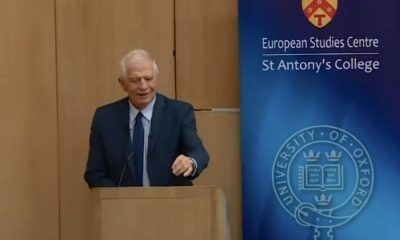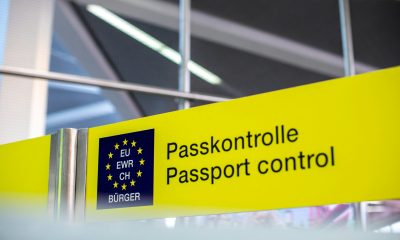EU
אי.יו. גיידלאַנס וועגן האַנדלינג פון וויזע אַפּלאַקיישאַנז פון רעזידאַנץ פון די # דאָנעצק און # לוהאַנסק מקומות

 The European Commission and the European External Action Service have this week sent EU member states and non-EU Schengen countries guidance on how to handle visa applications lodged by residents of the non-Government controlled areas of Ukraine's Donetsk and Luhansk regions. The guidance document follows up on the European Council Conclusions of 20 June 2019 and the Member States' requests for guidance on the identification and non-recognition of the passports issued as a consequence of the Russian presidential decree of 24 April.
The European Commission and the European External Action Service have this week sent EU member states and non-EU Schengen countries guidance on how to handle visa applications lodged by residents of the non-Government controlled areas of Ukraine's Donetsk and Luhansk regions. The guidance document follows up on the European Council Conclusions of 20 June 2019 and the Member States' requests for guidance on the identification and non-recognition of the passports issued as a consequence of the Russian presidential decree of 24 April.
The guidance sent provides a set of uniform treatment criteria to help member states' consulates to establish the actual place of legal residence of Russian passport holders, as well as details on how to process visa applications by residents of the non-Government controlled areas of Ukraine's Donetsk and Luhansk regions holding Russian passports.The guidance will help ensure that EU rules on Schengen visas are correctly and consistently applied in the Russian Federation and Ukraine, taking also into account that Ukrainian nationals have the possibility to acquire Ukrainian biometric passports and travel to the EU without a visa.
The document sent provides guidance on:
- Consular territorial competence rules: אונטער די אי.יו. וויזע קאָוד, as a rule, Schengen visa applicants who legally reside in the non-Government controlled areas of Ukraine's Donetsk and Luhansk regions should lodge their visa application at Member States' consulates in Ukraine, regardless of the travel document they hold.
- Clear information to the public: אונטער די אי.יו. וויזע קאָוד, Schengen Member States should provide clear and comprehensive information on how and where to lodge a visa application. Member States' consulates in the Russian Federation and in Ukraine (as well as their Visa Centres) should therefore clearly communicate that residents of the non-Government controlled areas of Ukraine's Donetsk and Luhansk regions have to apply for a visa in the consulate of the relevant Schengen Member State in Ukraine. They should also explain that Ukrainian nationals holding biometric passports do not need a visa to travel to the Schengen area.
- Criteria for the identification of passports issued following the 24 April decree: A set of criteria is provided to help Member States' consulates identify the Russian passports issued to residents of the non-Government controlled areas of Ukraine's Donetsk and Luhansk regions. They may form the basis for a non-recognition policy to be implemented by Member States in the exercise of their exclusive competence.
הינטערגרונט
On 24 April 2019, the President of the Russian Federation signed a decree making it easier for residents of the non-Government controlled areas of Ukraine's Donetsk and Luhansk regions to obtain Russian citizenship and receive Russian passports. Under the decree, residents of these regions can apply for Russian citizenship using an identification document issued by the so-called ‘authorities' in the non-Government controlled areas, without being required to reside in the Russian Federation.
The European Council, in its קאָנקלוסיאָנס adopted on 20 June 2019, expressed its utmost concern about this presidential decree, stating that it runs counter to the spirit and objectives of the Minsk agreements. The European Council agreed to consider further options, including the non-recognition of these passports issued in contradiction to the Minsk agreements.
The guidance sent this week was developed in close cooperation with Member States and Schengen Associated countries. It is not a public document as it contains indications for Member States consuls on how to detect these passports.
מער אינפֿאָרמאַציע
שער דעם אַרטיקל:
-

 פּראָסט פרעמד און סעקוריטי פּאָליטיקקסנומקס טעג צוריק
פּראָסט פרעמד און סעקוריטי פּאָליטיקקסנומקס טעג צוריקאי.יו. פרעמד פּאָליטיק טשיף מאכט פּראָסט סיבה מיט וק צווישן גלאבאלע קאַנפראַנטיישאַן
-

 EUקסנומקס טעג צוריק
EUקסנומקס טעג צוריקוועלט פרעסע פרייהייט טאָג: סטאָפּ מעדיע באַן מעלדן אייראפעישער פּעטיציע קעגן מאָלדאָוואַן רעגירונג קראַקדאַון אויף פּרעסע.
-

 קירגיזיעקסנומקס טעג צוריק
קירגיזיעקסנומקס טעג צוריקדי פּראַל פון מאַסע רוסיש מיגראַטיאָן אויף עטניק טענסיאָנס אין קירגיזיע
-

 יממיגראַטיאָןקסנומקס טעג צוריק
יממיגראַטיאָןקסנומקס טעג צוריקוואָס זענען די קאָס פֿאַר בעכעסקעם מיטגליד שטאַטן אויס פון אי.יו. ס באָרדערלעסס זאָנע
























